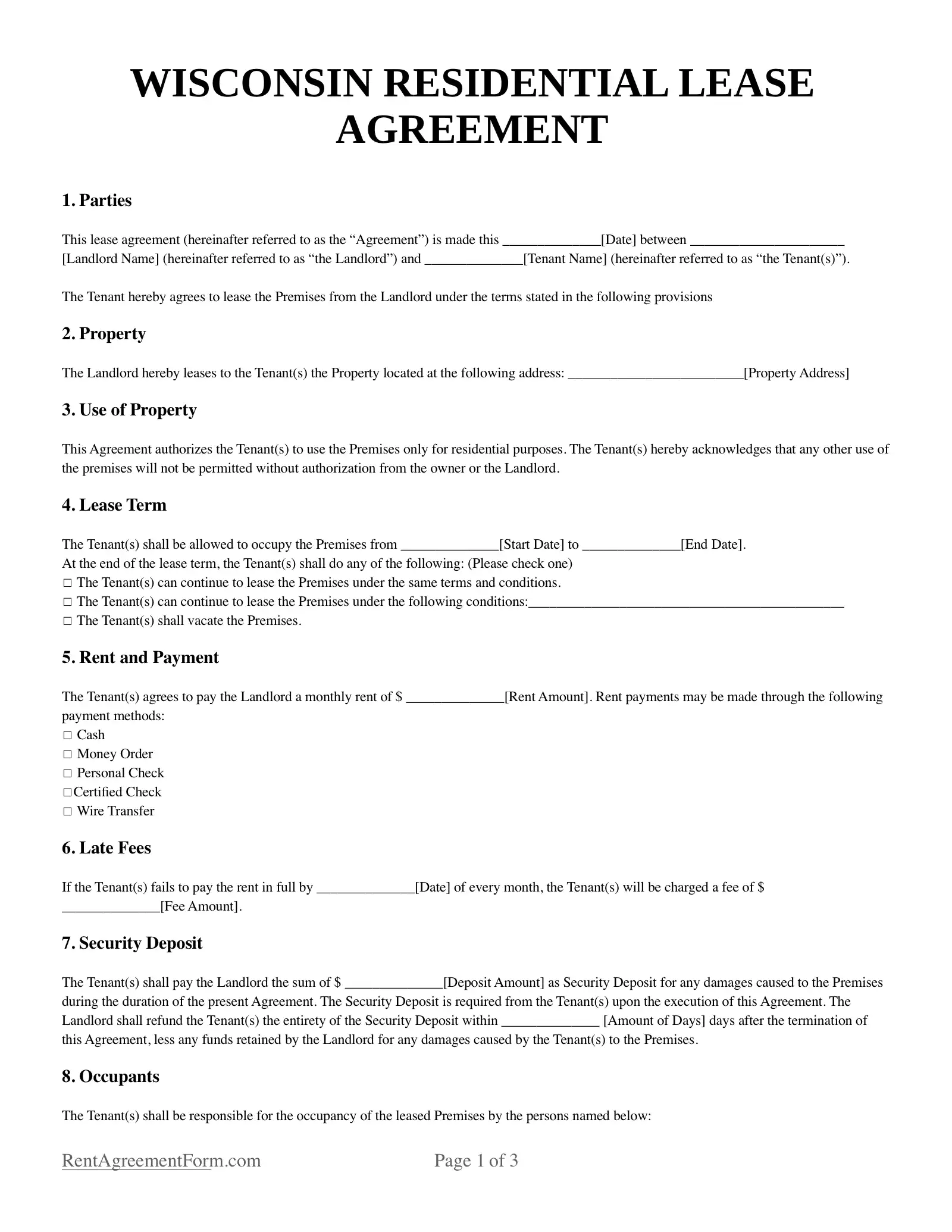Wisconsin Residential Lease Agreement Form
Renting a place in Wisconsin means you have to submit a Wisconsin rental application form and pay the corresponding fee to be considered for tenancy. If approved, you and your landlord will proceed by signing a Wisconsin Residential Lease Agreement Form.
A residential lease agreement form is a contract between the landlord and tenant regarding the use of an apartment or rental property. The legal document provides a brief description of the property and details the responsibilities of both parties.
On the part of the landlord, their main responsibilities are ensuring the rental property is safe and habitable for the tenant. The tenant, on the other hand, must pay rent on time and take care of the property. The landlord and tenant can also agree on other specific terms. For example, the landlord can stipulate that there should be no loud music or parties after a certain hour.
For this reason, a good lease agreement form outlining each party’s responsibilities is worth having.

Required Disclosures in Wisconsin Residential Lease Agreements
- Landlord’s Name and Address - The state requires landlords to put their contact information in the lease agreement for the tenant’s benefit. The name and address are necessary for communication and legal notices (ACTP 134.04).
- Utility Disclosure - Some towns and cities in Wisconsin require their landlords to disclose utility arrangements, whether the rent already includes utility fees or not. This helps tenants know how utilities are paid and if paying for them is part of their responsibilities.
- Shared Utility Arrangements - In some towns and cities, Wisconsin landlords are also required to disclose utility payments. This is the case with properties where landlords and tenants share a master meter or submeter. The disclosure should specify how to divide the payment so both parties can readily share the responsibility (ACTP 134.04(3)).
- Habitability of Property - Landlords should provide tenants with a check-in sheet that details the condition of the property. The sheet should be returned within seven days of the move-in date. The same sheet will be used as a basis when deducting damage costs from the security deposit.
- Lead-Based Paint Disclosure - This is a standard disclosure in most lease agreements since lead-based paint was banned in the country in 1978. If the rental property was built before that year, the landlord should inform the tenant. Moreover, the landlord should provide the tenant with educational materials about the dangers of lead-based paint (Lead-Based Paint Disclosure Rule (Section 1018 of Title X).
Residential Lease Agreement Rent Grace Period in Wisconsin
A tenant has 30 days to pay their unpaid rent. There is no statute on late fees in Wisconsin, but there can be provisions for it as long as both parties agree. If there is a rent grace period, it should be mentioned in the lease agreement for it to be binding.
Should the tenant fail to pay rent even after the 30-day grace period, the landlord can send the tenant a notice to vacate the property. The tenant will then have five days to vacate the property or settle the unpaid rent.
Security Deposits for Winsconsin RLA
Landlords are not required to charge a security deposit. However, landlords are advised to collect security deposits in case tenants fail to pay rent. This amount can also be used to repair damage to the real estate at the end of tenancy as long as the damage is beyond usual wear and tear.
In the state of Wisconsin, there is no limit to how much a landlord can charge as a security deposit. After the lease ends, the landlord has up to 21 days to return the security deposit or part of it (WI Stat § 704.28 (2021)).